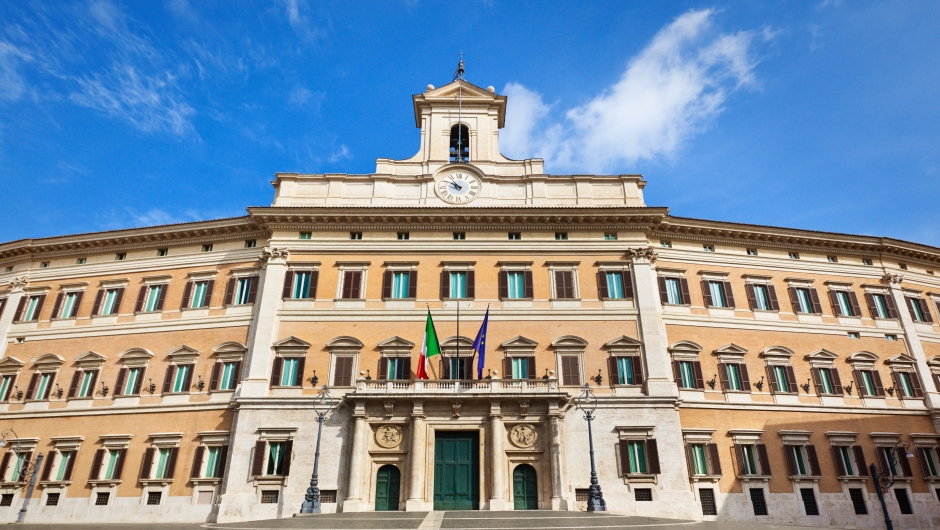Italy
Political Turmoil in Italy: Next Exit “Ursula-Coalition”?

Parlamentsgebäude in Rom, Italien
© YinYang/ iStock Gettyimages/ adaptiertAfter the resignation of Italian Prime Minister Giuseppe Conte, a new government needs to be formed in Italy. One of the most discussed options is a government of an “Ursula” majority, referring to the fact that the parties involved have chosen Ursula von der Leyen as President of the EU Commission. This government of „national rescue“ would comprise four parties, the populist Five Star Movement, the Social Democrats (PD) and the left-wing Liberi ed Uguali – and the party of former prime minister Silvio Berlusconi – who suddenly is back in the game. “Forza Italia” with its aging president – Berlusconi is 84 years old - has been in a downward spiral for years. According to polls only about six percent would vote for the party, which is conservative and part of the European People's Party. On the national level Forza Italia has been part of the right wing alliance so far, even though having little in common and being overtaken on the right by the nationalist programme of Matteo Salvini's right-wing Lega and the post-fascist Fratelli d'Italia (Brothers of Italy) of Giorgia Meloni.
The government had burst over a dispute of the allocation of the billions of Euros from the Corona aid promised by the EU and the subsequent withdrawal of Ex-prime minister Matteo Renzi and his small party Italia Viva (IV) from the coalition government (withdrawal of two ministers, Elena Bonetti, Family and Equal Opportunities, and Teresa Bellanova, Agricultural Policy, as well as the secretary of state Ivan Scalfarotto). Conte survived the subsequent vote of confidence, but not yet the government crisis. In the smaller chamber, the Senate, Conte achieved a relative majority with 156 votes in favour, 140 against and 16 abstentions (Italia Viva), thanks to the support of honorary senators who usually do not participate in the legislative process, as well as defectors from the ranks of the independents and the opposition. Despite this move, which was widely criticized in Italy and abroad as unreasonable, politically motivated and irresponsible in the times of a pandemic, Renzi has left a back door open: a return to the cabinet of a Conte III government is not ruled out yet, leading politicians of the Social Democrats and the Five Star movement have already stepped down from their initial reaction to not work with Italia Viva anymore. In the projections of the Italian media for a possible new majority in parliament, Italia Viva is also included in the "maggioranza Ursula".
Despite the political turbulences, the least likely scenario are the dissolution of Parliament by president Sergio Mattarella and early elections in June. Mattarella wants to avoid new elections just like the center-left forces in the parliament, because very likely the far right, Lega and Fratelli d'Italia, would win. The political theater in Rome to the chagrin of political stability will continue. Which exit will be taken in the middle of a pandemic and huge challenges ahead, we shall see in the acts yet to come.
Opinion comment by Enzo Marzo, Critica Liberale
As far as the government crisis is concerned, it is a political crisis, which in no way concerns the Recovery Fund or the ESM. Renzi's objective is simply to replace Conte with a premier belonging to classical politics: until 2018 Conte had never been in politics and he does not derive from the classic Italian parties. In Renzi's view, the replacement of Conte could favour an enlargement of the government majority also to the right-wing centrists. However, this hypothesis might not find the 5-star movement available, so there could be early elections for which sovereigntist and nationalist right-wing parties are leading the polls. Italy's real problem is the unwillingness of all parties to promote the reforms that are essential to make Italy competitive and thus to have greater economic development.
Public administration reform, digitalisation and judicial reform are probably the most urgent needs. Italian politics prefers to deal with petty power squabbles rather than striving to find a mediation, even between the majority and the opposition, to carry out indispensable reforms.
Currently, Conte is supported by Liberi ed Uguali (left wing, halfway between PSOE and GUE) Democratic Party (PSOE) - 5 Star Movement, who voted for Conte's confidence, even some two or three MPs from Forza Italia, while Emma Bonino's Più Europa voted against, together with Forza Italia (PPE), Salvini's Lega (ID) and Fratelli d'Italia (ECR), Renzi's Italia Viva, after provoking the political crisis, abstained.
We are very concerned about the inability of all politicians to deal with the seriousness of the moment. We must recognise that the Conte government, given the dramatic conditions in which the national health service found itself, demonstrated good management skills in managing the Covid emergency, complicated by the fact that competence over health policy is entrusted to the regions, with which the national government must mediate every time.
